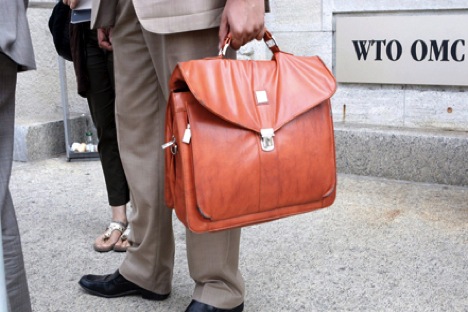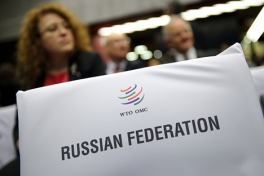WTO entry: salvation or affliction for Russia’s inflation

Russia becomes a full WTO member. Source: ITAR-TASS
Russia finally became a WTO member last week, exploring uncharted waters and opening future debates on the economic consequences of the step. The Central Bank has long been praising its tough stance on inflation, making consumer price growth pivotal for any policy move. Severe weather conditions leading to a poor harvest and a hike in utility tariffs in July, brought the issue back to the top of the policymaker’s agenda.
Currently lacking tools to tame inflation growth in the country, the Central Bank is pinning its hopes on the WTO accession. Under the rules of the organisation, import duties should dip and then drag down prices for various types of consumer goods.
The financial regulator asserted its readiness to keep inflation at record lows for the second consecutive year. It, however, abstained from raising interest rates so far. A presumed drop in prices could underpin the rationale behind this strategy.
Yet Alfa Bank, Russia’s biggest private lender, does not share the optimism, calling the Central Bank’s stance “risky”. Bloomberg Businessweek quoted Alfa Bank’s economists, Natalia Orlova and Dmitry Dolgin, as saying the, “WTO entry will lead to a cut in import duties starting at the end of August, and appears to be the core reason for the Central Bank’s optimism. September price growth would need to shift to deflation to confirm the WTO’s positive impact on the inflation trend, which we see as unlikely.”
An import tariff cut may not only fail to bridle consumer price growth in Russia, but could potentially have the exact opposite effect. Lower prices may trigger a spike in consumer spending, pushing inflation rates way beyond the anticipated corridor of 5-6 percent this year.
Although another opinion on the situation is that the WTO membership will have a minor, if any, impact on inflation in the country. Natalya Volchkova, professor at New Economics School, postulates that the entry will have no tangible effect on consumer price growth in the medium to long term.
“We will see no drop in prices due to tariff reduction. Over the first six months or overall year there might be only a slight decrease in inflation because of the WTO accession” – Volchkova commented by phone on Tuesday.
Volchkova also suggested that the cut in import duties will not automatically translate into lower prices, as many would have hoped. “There are a lot of inefficiencies in intermediaries operating between customs and the consumers. A lot of them aim to secure their profits, in many cases using some administrative resources or other types of market power” Volchkova said, adding that the membership, “won’t have any structural or systematic effect on Russia’s inflation.”
While the influence of the WTO accession on inflation in Russia should reveal itself within months, Economic Minister Andrei Belousov has recently unveiled yet another consumer price growth figure, claiming it to reach 7 percent this year.
Arguably, diverging estimates fail to boost policymakers’ credibility, adding fuel to the fire of the already exaggerated speculation over the issue.
All rights reserved by Rossiyskaya Gazeta.
Subscribe
to our newsletter!
Get the week's best stories straight to your inbox
